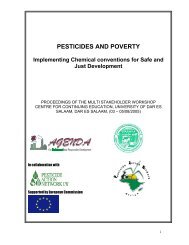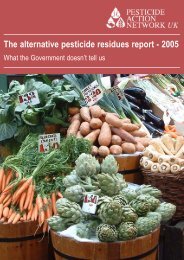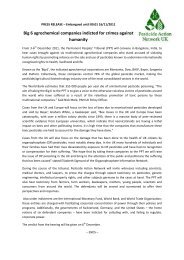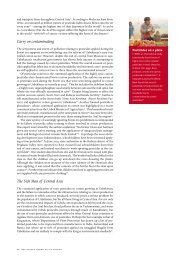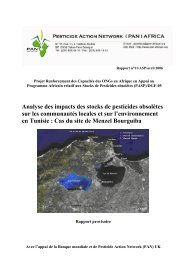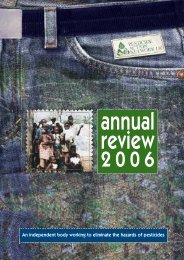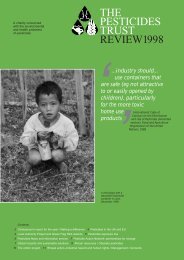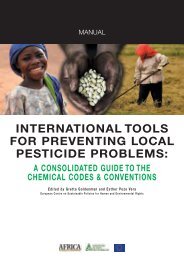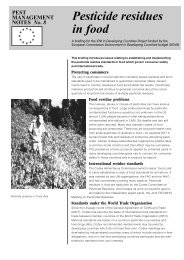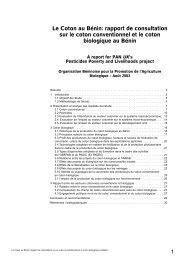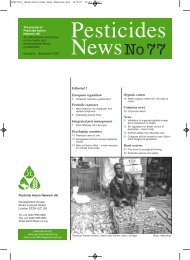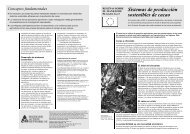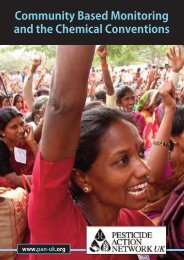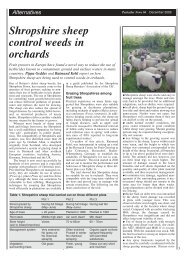Your Daily Poison - Pesticide Action Network UK
Your Daily Poison - Pesticide Action Network UK
Your Daily Poison - Pesticide Action Network UK
Create successful ePaper yourself
Turn your PDF publications into a flip-book with our unique Google optimized e-Paper software.
5 Conclusions and Recommendations<br />
The need for a more precautionary approach<br />
to the approvals and use of pesticides is now<br />
imperative, and a national strategy for a<br />
government-led, coordinated reduction in the<br />
use of these toxic substances is urgently<br />
needed to protect human health and the<br />
environment.<br />
People continue routinely to be exposed to<br />
pesticides in food, water and the environment,<br />
reflecting the lack of progress in reducing<br />
dependence on these toxic compounds in<br />
agriculture. Despite the trend towards lowerdose<br />
pesticides that are used in smaller<br />
quantities than previously, the total amount of<br />
pesticides used in the <strong>UK</strong> in agriculture in 2004<br />
rose to over 31,000 tonnes. The new national<br />
strategy must set clear targets for a<br />
coordinated reduction of use.<br />
The costs to human health cannot currently be<br />
accurately assessed. A new surveillance<br />
system is needed which is quick and easy to<br />
access, and provides prompt and efficient<br />
investigation and biochemical analysis. Medical<br />
outcomes should be monitored.<br />
The existing government schemes should be<br />
analysed and amalgamated so numbers of<br />
people whose health has been affected by<br />
exposure to pesticides can be accurately<br />
assessed. It is currently not possible to<br />
estimate how many exposures occur because<br />
each scheme does not indicate whether or not<br />
cases have also been reported to the others.<br />
The health effects of chronic exposures to low<br />
doses of pesticides, to which we are all<br />
subject, are uncertain.<br />
PAN <strong>UK</strong> urges the government to make the<br />
following changes to achieve a reduction in<br />
people’s pesticide exposure; improvements in<br />
the governance of pesticides; the<br />
strengthening of post-approvals human health<br />
surveillance for pesticide-related disease; and<br />
the provision of public information. We want to<br />
see a reduction in use of 50 per cent by 2015,<br />
and major reductions in exposure via food,<br />
water and the environment.<br />
The government should:<br />
REDUCE PEOPLE’S PESTICIDE EXPOSURE<br />
1. Include in the national pesticides strategy<br />
an action plan for the protection of public<br />
health. High levels of pesticide use<br />
inevitably result in continuing exposure of<br />
people through residues in food, water, and<br />
in the environment. The national strategy<br />
should include clear targets for reduction. A<br />
comprehensive national pesticide usage<br />
reporting scheme should be incorporated<br />
and there should be disclosure of sales and<br />
usage records.<br />
2. Press for a lowering of the European<br />
Commission legal limit for pesticides in<br />
water in line with the current advances in<br />
scientific limits of detection and application<br />
of precautionary standards.<br />
3. Adopt and implement fully the<br />
recommendations in the Prague<br />
Declaration (Appendix 8, page 44,<br />
Shortcomings of the current regulatory<br />
framework, and Proposed measures and<br />
actions to be taken) in its own policy and<br />
practice and through its civil servants,<br />
employees, consultants, contractors and<br />
others as relevant.<br />
IMPROVE THE GOVERNANCE OF<br />
PESTICIDES<br />
4. Carry out an independent review, possibly<br />
through the current Hampton review<br />
process, of the ACP and PSD, involving the<br />
Department of Health and the Health<br />
Protection Agency, and open up their<br />
procedures to public scrutiny. Complete<br />
restructuring of the regulatory authorities<br />
should be considered. Public health must<br />
be prioritised above chemical pest control,<br />
and the Department of Health/HPA should<br />
be given a more powerful remit in relation<br />
to pesticide-related disease.<br />
5. Prevent conflicts of interest in the decisionmaking<br />
process on pesticide testing and<br />
approval by separating the functions of<br />
pesticide policy making from the pesticide<br />
approvals procedures, which receive a<br />
proportion of its funds from the<br />
agrochemical industry.<br />
the second <strong>UK</strong> pesticide exposure report 17



